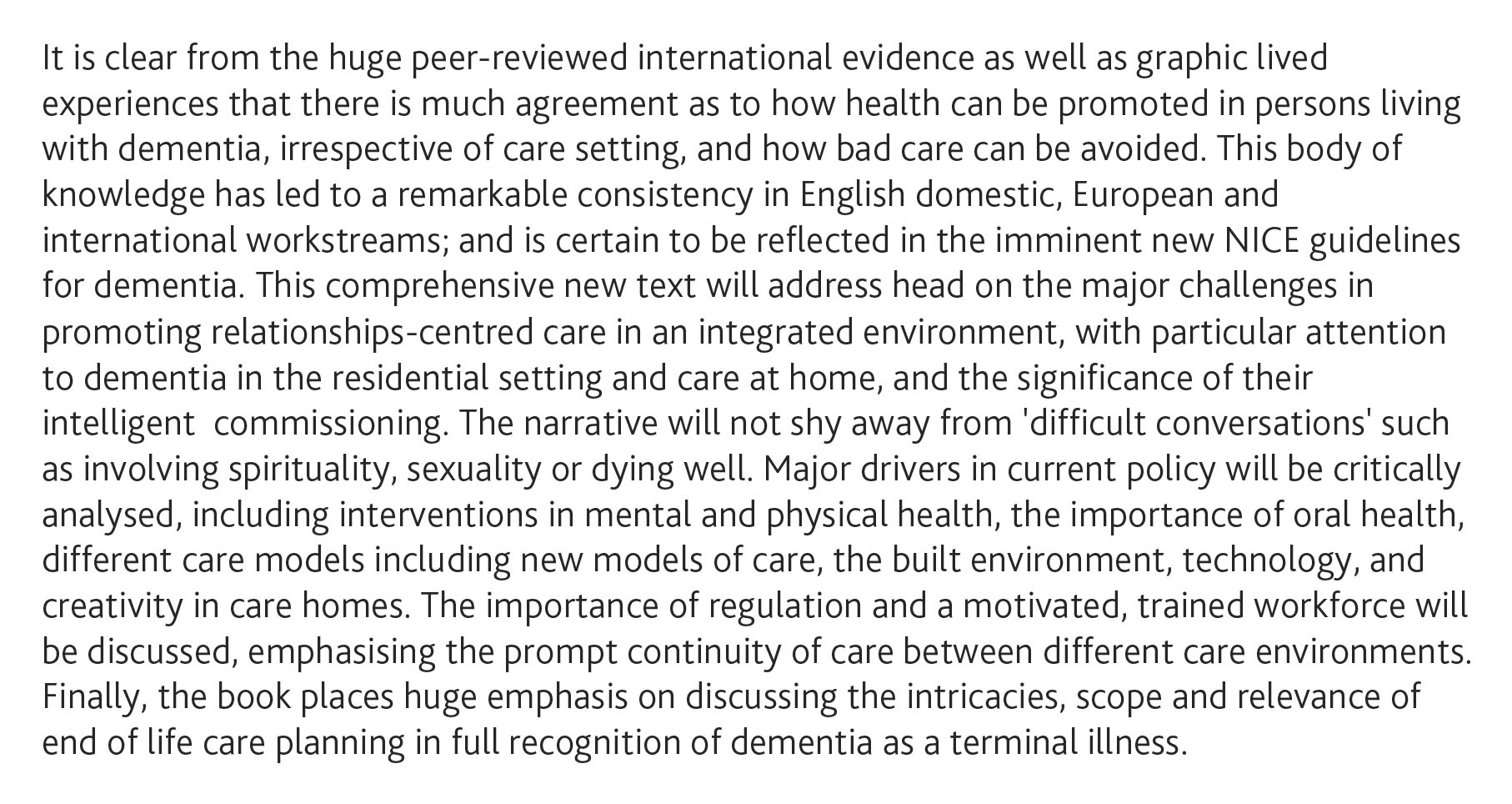The references are given as below. This will give you a good flavour of the topics I wish to cover in my final book.
I am honoured that the Forewords to my book will be written by Prof Sube Banerjee, Chair in Dementia at Brighton and Sussex Medical School, Lisa Rodrigues and Lucy Frost.
Alderwick, H, Robertson, R, Appleby, J, Dunn, P, Maguire, D (on behalf of the King’s Fund (2015)) Better value in the NHS The role of changes in clinical practice. http://www.kingsfund.org.uk/publications/better-value-nhs
Alldred DP, Standage C (2011) Medication errors in care homes. Nursing Times; 107: 24, early online publication.
Alzheimer’s Society (2015) Dementia 2015: aiming higher to transform lives. http://www.alzheimers.org.uk/site/scripts/download_info.php?fileID=2700
Bahar-Fuchs A, Clare L, Woods B. Cognitive training and cognitive rehabilitation for persons with mild to moderate dementia of the Alzheimer’s or vascular type: a review. Alzheimers Res Ther. 2013 Aug 7;5(4):35. Review.
Banerjee S. Multimorbidity–older adults need health care that can count past one. Lancet. 2015 Feb 14;385(9968):587-9.
Bartlett, P. Sex, Dementia, Capacity and Care Homes Liverpool Law Rev (2010) 31:137–154 DOI 10.1007/s10991-010-9077-6, available at http://eprints.nottingham.ac.uk/1440/1/Sex_Capacity_and_Care_Homes_(published_version).pdf.
Burns, A. (2014) Commentary by NHS England: Don’t let care home residents slip through the dementia net – Alistair Burns https://www.england.nhs.uk/2014/12/18/alistair-burns-12/
Cancer Research UK (2015) Achieving world-class cancer outcomes: a strategy for England 2015-20. http://www.cancerresearchuk.org/sites/default/files/achieving_world-class_cancer_outcomes_-_a_strategy_for_england_2015-2020.pdf
Care England (2015) Care England calls for funding to support Living Wage (published on June 25, 2015) http://www.careengland.org.uk/care-england-calls-funding-support-living-wage
Care Quality Commission (2014) Cracks in the pathway. October 2014. http://www.cqc.org.uk/sites/default/files/20141009_cracks_in_the_pathway_final_0.pdf
Elliot V, Williams A, Meyer J. Supporting staff to care for people with dementia who experience distress reactions. Nurs Older People. 2014 Aug;26(7):22-6. doi: 10.7748/nop.26.7.22.e616.
Fiske, J., Griffiths, J., Jamieson, R., Manger, D. (2000). Guidelines for oral health care for long stay patients and residents. Gerodontology, 17, 5564.
Goodman C, Davies SL, Gordon AL, Meyer J, Dening T, Gladman JR, Iliffe S, Zubair M, Bowman C, Victor C8, Martin FC. Relationships, expertise, incentives, and governance: supporting care home residents’ access to health care. An interview study from England. J Am Med Dir Assoc. 2015 May 1;16(5):427-32.
Guss, R. and the British Psychological Society (2014). Clinical Psychology in the Early Stage Dementia Care Pathway (Collated on behalf of the Faculty of the Psychology of Older People. A collaboration of people living with dementia and the Dementia Workstream Expert Reference Group.) https://www.bps.org.uk/system/files/user-files/DCP%20Faculty%20for%20the%20Psychology%20of%20Older%20People%20(FPoP)/public/clinical_psychology_in_early_stage_dementia_care_pathway.pdf
Health Foundation (2012) A strong call to action. http://www.health.org.uk/newsletter/challenge-improve-medication-safety-care-homes#sthash.i6DVulZf.dpuf
Humphries R. Integrated health and social care in England–Progress and prospects. Health Policy. 2015 Jul;119(7):856-9.
Iliffe S, Davies SL, Gordon AL, Schneider J, Dening T, Bowman C, Gage H, Martin FC, Gladman R, Victor C, Meyer J, Goodman C. Provision of NHS generalist and specialist services to care homes in England: review of surveys. Prim Health Care Res Dev. 2015 May 5:1-16. [Epub ahead of print]
Johnston B, Rogerson L, Macijauskiene J, Blaževičienė A, Cholewka P. An exploration of self-management support in the context of palliative nursing: a modified concept analysis. BMC Nurs. 2014 Jul 23;13:21.
Jones L, Candy B, Davis S, Elliott M2, Gola A, Harrington J, Kupeli N, Lord K, Moore K, Scott S, Vickerstaff V, Omar RZ, King M, Leavey G, Nazareth I, Sampson EL.Development of a model for integrated care at the end of life in advanced dementia: A whole systems UK-wide approach. Palliat Med. 2015 Sep 9.
Learner, S. (2014) Profile: ‘Caring for my father was a privilege I wished had never ended,’ says dementia campaigner Beth Britton (February 2014) http://www.carehome.co.uk/news/article.cfm/id/1563115/profile-dementia-campaigner-beth-britton
Lundgren D, Ernsth-Bravell M, Kåreholt I1. Leadership and the psychosocial work environment in old age care.Int J Older People Nurs. 2015 Jun 15.
McCormack B, Roberts T, Meyer J, Morgan D, Boscart V. Appreciating the ‘person’ in long-term care. Int J Older People Nurs. 2012 Dec;7(4):284-94.
McKeown J, Ryan T, Ingleton C, Clarke A.’You have to be mindful of whose story it is': the challenges of undertaking life story work with people with dementia and their family carers. Dementia (London). 2015 Mar;14(2):238-56.
Miranda-Castillo C, Woods B, Orrell M. People with dementia living alone: what are their needs and what kind of support are they receiving? Int Psychogeriatr. 2010 Jun;22(4):607-17.
NHS England (2014). Five year forward view: Time to deliver. London: NHS. http://www.england.nhs.uk/wp-content/uploads/2015/06/5yfv-time-to-deliver-25-06.pdf
NICE commissioning guides [CMG48] Support for commissioning dementia care Published date: April 2013, https://www.nice.org.uk/guidance/cmg48
NICE quality standard [QS50] Mental wellbeing of older people in care homes Published date: December 2013 https://www.nice.org.uk/guidance/qs50
Oliver D, Healey F, Haines TP. Preventing falls and fall-related injuries in hospitals. Clin Geriatr Med. 2010 Nov;26(4):645-92.
Sampson EL, van der Steen JT, Pautex S, Svartzman P, Sacchi V, Van den Block L, Van Den Noortgate N. European palliative care guidelines: how well do they meet the needs of people with impaired cognition? BMJ Support Palliat Care. 2015 Sep;5(3):301-5.
UK Home Care Association. How to choose care.
http://www.ukhca.co.uk/choosingcareadvice.aspx
UK Homecare Association (2013). UKHCA Dementia Strategy and Plan, February 2013. Wallington: UK Homecare Association.
Zenthöfer A, Cabrera T, Rammelsberg P, Hassel AJ. Improving oral health of institutionalized older people with diagnosed dementia. Aging Ment Health. 2015 Feb 13:1-6.




